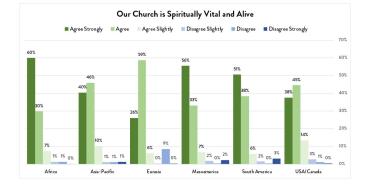An Ongoing Story

The Wesleyan-Holiness Digital Library (WHDL) was created to be a system for delivering vital content around the world for the preparation and support of ministers in the Church of the Nazarene. As the system developed, some exciting things began to happen. Through cutting edge technology, it was determined that the library could be stretched to include much more, without losing its core purpose of serving as a resource to pastors. That broader reach includes providing institutional repositories for Nazarene colleges, universities, and seminaries.
An institutional repository is one way our institutions are able to expand their influence and connections across the globe.
By gathering the best scholarship from their faculty, students, history, and alumni, each institution is able to contribute to the knowledge base, develop collaborative partnerships, market the institution, and more fully establish the credibility of the scholarship of their students and faculty. Online presence is an important way that students and stakeholders learn about and engage with an institution of higher learning. Additionally, most research grants require the institution to have an open source or a way to access their data for free before it can apply for grants. WHDL provides this important service.
Thanks to the creativity, vison, and expertise of the WHDL.org development team, we are able to provide branded institutional repositories for Nazarene education institutions and ministries. Each institution is able to create special collections of their scholarship and archives that are housed in their WHDL.org repository. These collections can then be accessed by anyone, anywhere in the world at no cost.
Impacting the Future of Education
The Church of the Nazarene has nurse training programs in Eswatini, India, Papua New Guinea, and throughout the United States. Right now, the scholarly work of all these students and faculty for nearly 100 years sits on the shelves of libraries or in dusty boxes in basements. What could happen if, in the next 10 years, the best of this scholarship is uploaded into institutional repositories associated with our Nazarene institutions?
Any researcher would immediately have access to all the collections. What might a researcher learn from nursing education across the globe? What might we learn about patient care from gathering scholarship from these institutions? We can only imagine what we can learn from each other when we have instant access to scholarly articles, dissertations, and theses from such a broad range of Christian institutions.
Cross-Disciplinary Resourcing
With a commitment to scholarship and developing institutional repositories came a pledge to have a multi-disciplined collection. WHDL.org and the institutional repositories within are intended to gather scholarship from across all the disciplines of our educational programs. In this way, for example, a student assigned to write an ethics paper for Christian ministry will get search results on ethics from the business, science, and medical communities, as well as from Christian ministry.
This will help our pastors to be informed thinkers capable of engaging in conversations beyond their area of expertise.
Currently, we have 23 institutional repositories that are developing collections relevant to the institution’s or ministry’s areas of specialization. For example:
- Nazarene Youth International provides training material for Youth Pastors and teens.
- MidAmerica Nazarene University includes archival material related to the early days of the institution and its leaders, but they also have scholarly resources in business, nursing, education, counseling, science, math, the arts, and Christian ministry.
- Northwest Nazarene University includes archives of “The Crusader,” their student newspaper. They also include scholarly resources from their graduate education dissertations and computer science theses.
- If you are interested in resources about women in leadership, the Wynkoop Center at Nazarene Theological Seminary might be of interest.
- Interested in Nazarene history? Nazarene Archives has beautiful and inspiring resources that tell the story of the Church of the Nazarene through pictures, biographies, and theological papers. Their resources also include District and General Assembly journals.
Each of these and the other 18 repositories are all branded to match their institution or ministry. However, all of the resources from all collections are accessible through WHDL.org and through regular internet searches. Through internet searches, the material from WHDL.org will find the researcher. Nazarene higher education institutions are stronger because they belong to a worldwide network.
Broadening Conversations
The story doesn’t end there. Because the system is scalable, we are able to invite ministry and education partners in sister denominations to join this project as well. Institutions like Indiana Wesleyan University and Seminary, Allegheny Wesleyan College, and Greenville University are our first partners. They will enrich the existing collections with their valuable archival resources and scholarship.
By gathering resources from across our network and our sister denominations, WHDL.org will be better equipped to prepare ministers for service in a changing world, as well as to equip laity around the world to serve as global leaders in their context.
The Wesleyan-Holiness Digital Library is your library. You are invited to access it and freely use the resources being gathered from all parts of the world in nearly 70 different languages. The most exciting reality is that we are just beginning our work. Right now, WHDL.org is a like a brand-new, beautiful library with about 7,000 valuable resources and unending empty shelves waiting to receive more and more, in order to serve a global community.
Tammy Carter is Administrative Director of the International Board of Education, Church of the Nazarene.
Holiness Today, Jul/Aug 2019
Please note: This article was originally published in 2019. All facts, figures, and titles were accurate to the best of our knowledge at that time but may have since changed.




